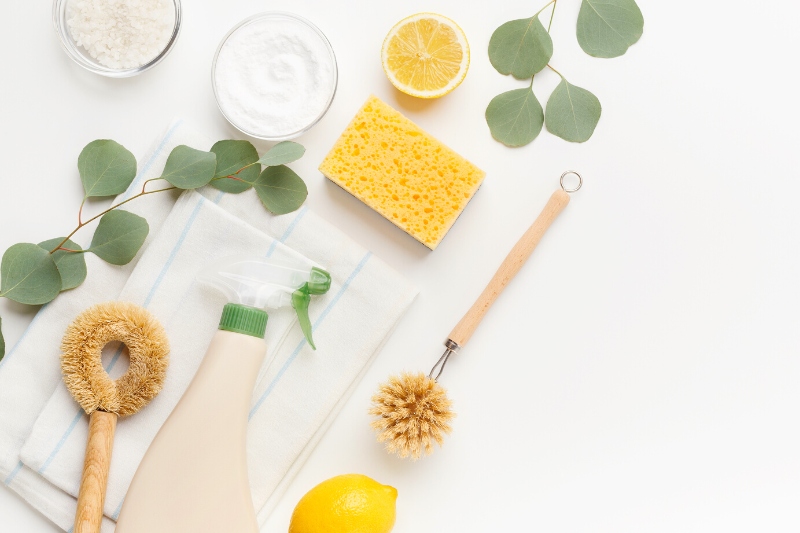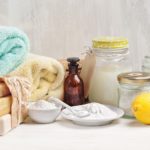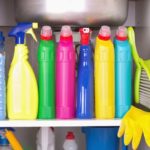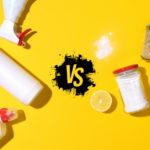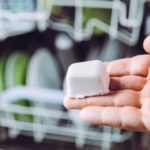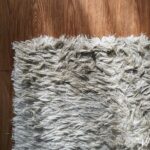Many people are trying to live more sustainably. From walking or cycling to work to shopping locally and wearing second-hand clothes, there are tons of ways that you can reduce your carbon footprint in your day-to-day life.
One of the best ways to be more eco-friendly is to start creating your own cleaning products!
This may sound complicated, but a wide variety of effective cleaners can easily be made with just a few simple ingredients, many of which are everyday items you already have in your home.
Below we have covered some of the best DIY cleaning recipes we have found, each using ingredients readily available in the UK.
You will also find a list of the benefits of using homemade cleaning products, such as reducing waste, saving money, and creating a healthier living environment.
1. All-Purpose Spray Cleaner
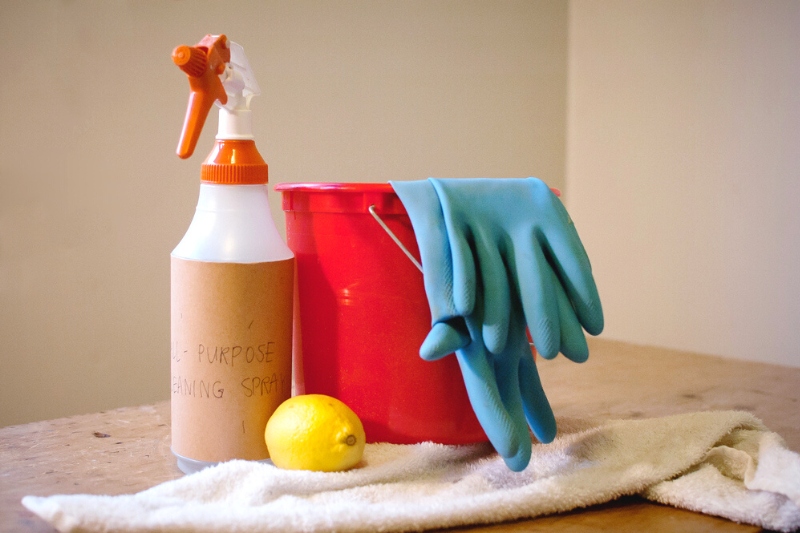
All-purpose cleaner is a must-have around the home. It can be used on various surfaces and works wonders on several types of dirt and grime.
To create a highly effective cleaning spray, simply combine the following ingredients in a spray bottle:
- 125 ml white vinegar
- 125 ml water
- The juice from half a lemon
- Ten drops of essential oil (optional)
This recipe utilises the acidity of white vinegar and lemon juice to help cut through any build-up you may need to tackle, while the essential oil helps to eliminate the sour smell of vinegar.
If you’d like to try a slightly different recipe, feel free to check out our comprehensive guide on how to make a homemade spray cleaner.
2. Glass Cleaner
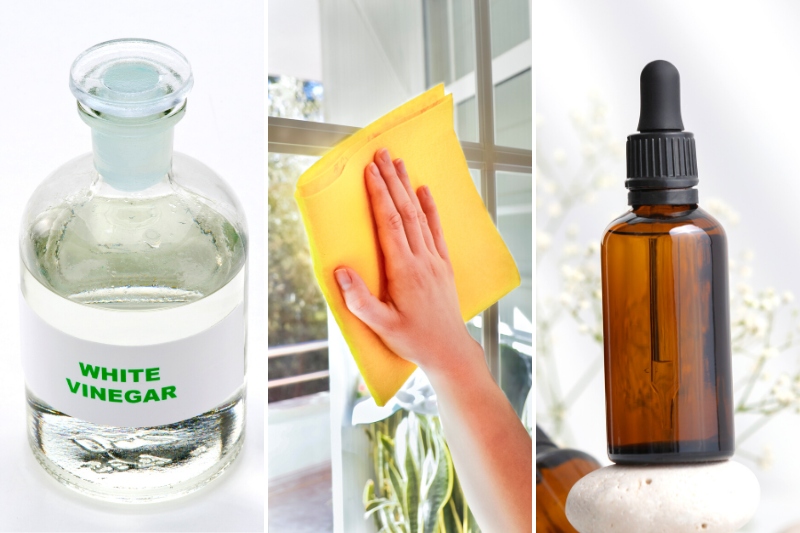
Although the all-purpose cleaner above can be used on windows and mirrors, you can also create your own glass cleaner if desired.
The following ingredients can be combined in a spray bottle and used as you would a commercial glass cleaner:
- 125 ml white vinegar
- 1 litre of water
- A few drops of essential oil (optional)
This cleaner will leave your windows and mirrors sparkly clean. However, we advise you to avoid using this product on a hot day, as it can leave streaks on the glass when it dries too quickly.
3. Stain Remover
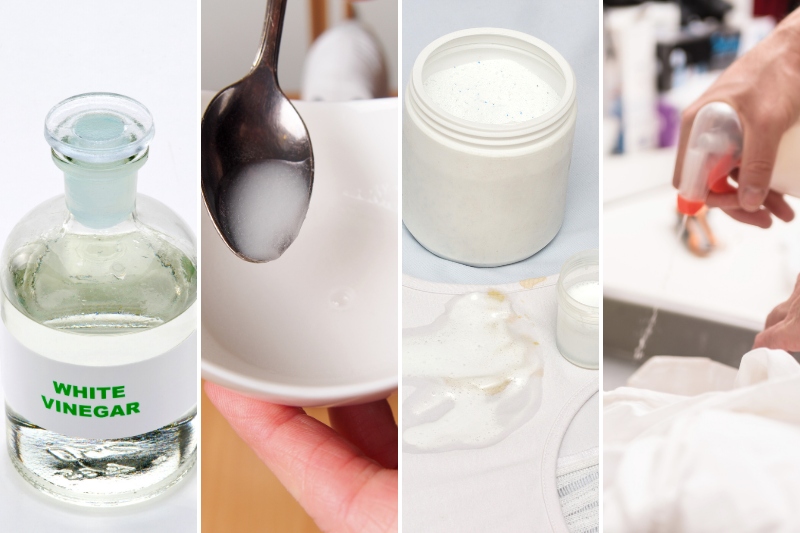
If you live in a house with young children, a good stain remover is vital. The ingredients below can be combined in a spray bottle and applied to your carpets or clothing to help remove unwanted stains.
- 60 ml white vinegar
- 60g bicarbonate of soda
- A few pumps of liquid soap
- 470 ml of water
Simply spray the solution directly onto a stain, leave it for a few minutes, and then wash it away!
There are also a variety of stain removers that can be used on different surfaces, such as wooden cutting boards and plastic Tupperware.
Lemon juice is excellent at removing stains from these surfaces and can be used on its own as a stain remover.
However, you can also combine it with other ingredients to make it slightly more effective if desired.
4. Dishwasher Detergent
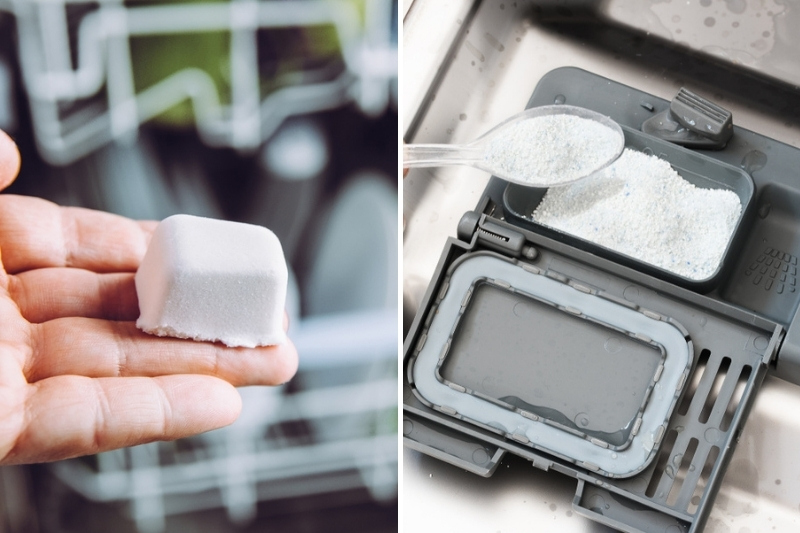
Homemade dishwasher detergents require a few more speciality ingredients compared to some of these other recipes, but they can still be easily found in the UK for a reasonable price.
If you prefer to work with dishwasher tablets, we have a recipe in our article on homemade dishwasher detergent recipes. However, the below ingredients can be combined to create a highly effective powder detergent within a couple of minutes:
- 900g soda crystals
- 225g citric acid powder
- 225g dishwasher salt
- A few drops of essential oil (optional)
Ensure the ingredients are thoroughly mixed before transferring the powder to a large airtight container.
When doing a wash cycle, simply add two tablespoons to your dishwasher’s detergent compartment and let it work its magic!
5. Laundry Detergent
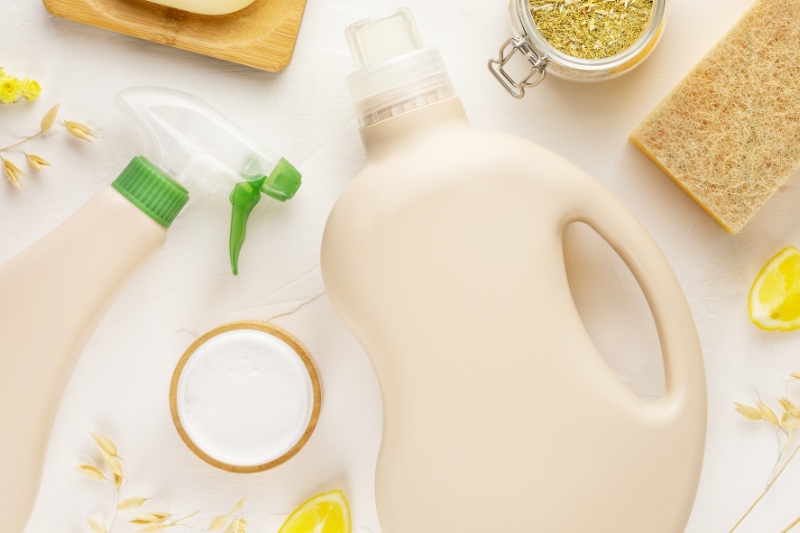
There are many different forms that laundry detergent can take.
The following recipe is for a liquid detergent as this is one of the more popular types, but you can also make a washing powder if that better suits your needs.
To create a liquid laundry detergent, you can simply follow the below steps:
- In a large bowl, dissolve 200g of soda crystals in 500 ml of boiling water.
- Slowly add 50g of bicarbonate of soda to the liquid, stirring continuously as you do so.
- Add 120ml of liquid soap, 1.5 litres of boiling water, and ten drops of essential oil (optional) to the bowl.
- Thoroughly stir the mixture and leave it to cool.
- Whisk the detergent if the ingredients have separated before pouring it into a bottle for storage.
This detergent is prone to separating, so give the bottle a good shake before every use. You then need to add roughly two tablespoons of the liquid to your detergent drawer for every load of washing.
6. Furniture Polish
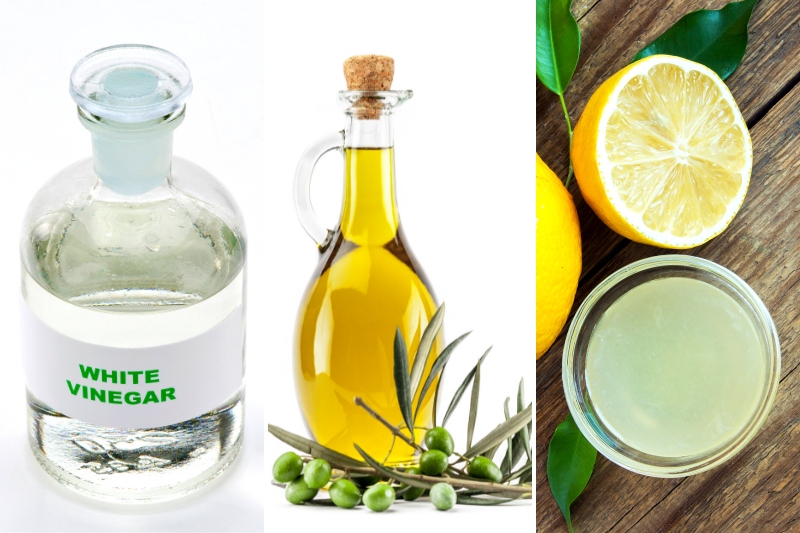
If you own a lot of wooden furniture, you’ll know how important a good furniture polish can be.
Olive oil is fantastic at restoring shine to wooden surfaces and can be used on its own as a furniture polish.
However, the following combination will give you the best results:
- 60 ml white vinegar
- 180 ml olive oil
- The juice of half a lemon
Once thoroughly combined, this mixture can be stored in a bottle for later use. Simply buff some of the polish into your furniture with a soft cloth when needed to leave behind a shiny finish.
7. Carpet Cleaner
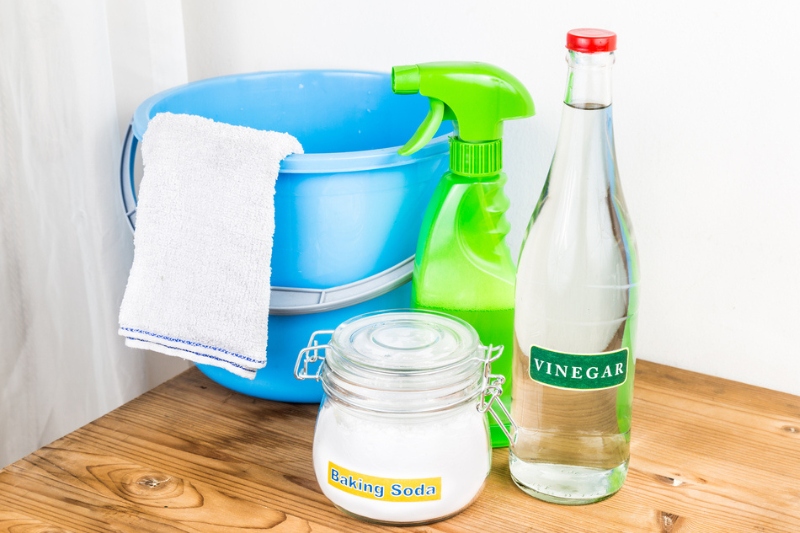
Over time, carpets are prone to becoming a bit smelly and stained. When this happens, you need a good carpet cleaner to restore the pile.
A detailed list of possible carpet cleaners can be found in our article on homemade carpet cleaner recpies, but a simple set of instructions that uses white vinegar and bicarbonate of soda can be seen below:
- Sprinkle a layer of bicarbonate of soda onto the carpet.
- Leave the powder to work for 5 minutes.
- Spray a mixture of water and white vinegar onto the bicarbonate.
- After 10 minutes, gently blot at the carpet to remove any dirt.
- Allow the carpet to fully dry before walking on it.
This method can be used on your whole carpet to freshen it up or on a specific area that has become stained or smelly. Simply adjust the amount of each ingredient depending on your needs.
Benefits of Using Homemade Cleaning Products
If you live a busy life, you may not want to spend time creating your own cleaning products.
However, it is worth considering the variety of benefits that come with using homemade cleaners around your home before making a final decision.
Customisability
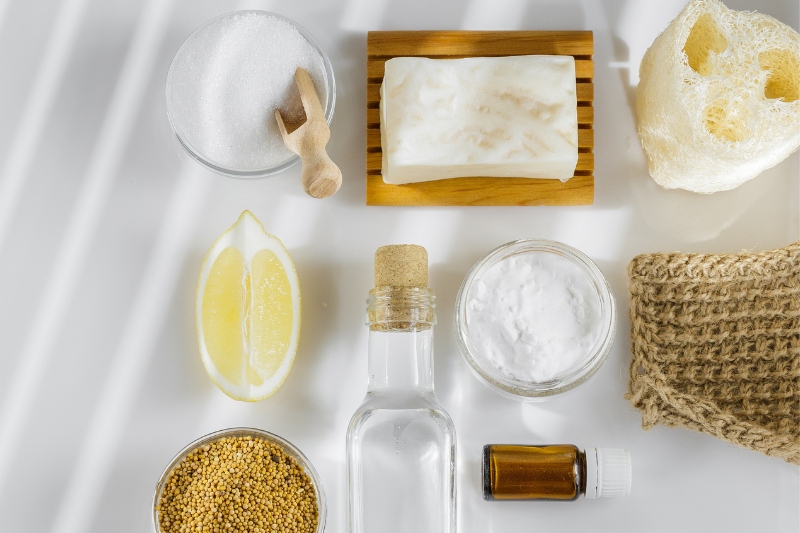
When you make your own cleaning products, you have the ability to tailor the recipes to fit your specific needs and preferences.
This means you can easily adjust the scent, strength, and effectiveness of each cleaning solution based on your cleaning requirements and any allergies you or your loved ones may have.
Cost-effectiveness
Homemade cleaning products are often more cost-effective than store-bought alternatives.
Common ingredients like vinegar and bicarbonate of soda are relatively inexpensive and can be used in multiple cleaning recipes. They can also be bought in bulk to help further reduce your household expenses in the long run.
Health benefits
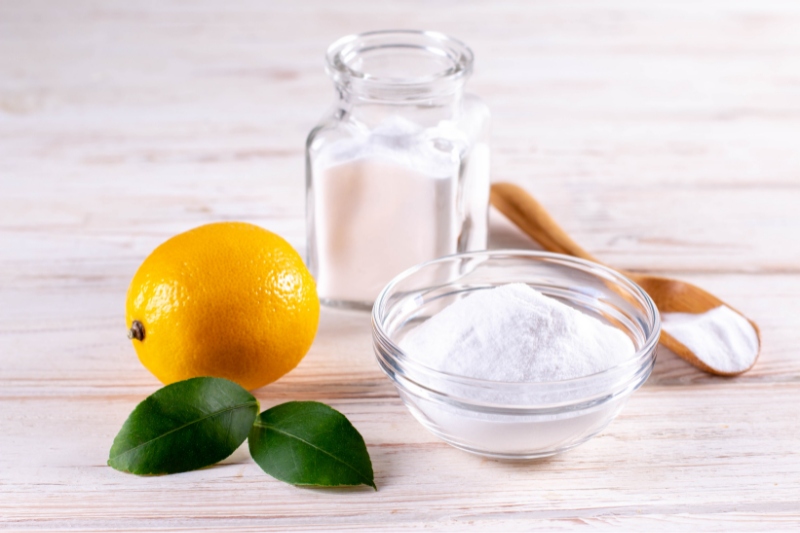
You may not realise it, but the majority of commercial cleaning products contain harsh chemicals and toxins that are generally bad for your health. These substances could cause allergic reactions and respiratory issues and are often corrosive or flammable.
Making your own cleaning products gives you complete control over the ingredients used. This means you can choose natural ingredients, such as white vinegar, lemon juice, and bicarbonate of soda, that are unlikely to cause any harm.
Environmental impact
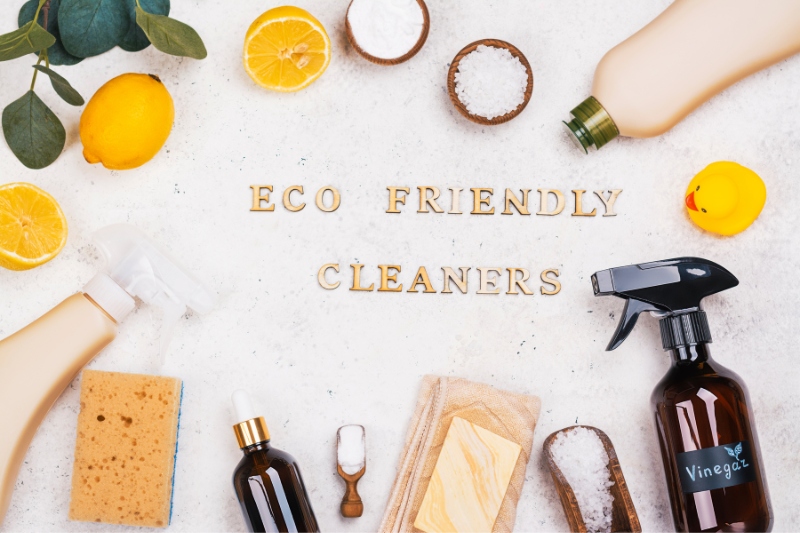
The chemicals used in commercial cleaning products are also harmful to the environment, as they can contribute to water pollution when washed down the drain.
As DIY cleaners are typically made from natural and biodegradable ingredients, they won’t negatively impact these aquatic ecosystems.
The containers you store these homemade products in can also be reused, meaning the amount of single-use plastic you use is greatly reduced. This minimises your contribution to landfills and the harmful substances they produce.
However…
It is important to note that although homemade cleaning products have all these benefits, there will still be times when a chemical cleaner is required.
The natural ingredients used in these recipes are great for day-to-day cleaning, but it is best to use a professional cleaner if you’re dealing with large quantities of bacteria (e.g., when someone in your home has recently been ill).

Hannah has a passion for cleaning. She worked her way around Australia by cleaning hostels in exchange for free accommodation and used her cleaning skills to bag a job as a chalet host for a luxury ski company in France.
